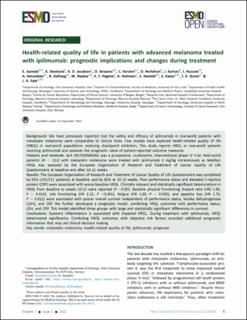| dc.contributor.author | Aamdal, Elin | |
| dc.contributor.author | Skovlund, Eva | |
| dc.contributor.author | Jacobsen, Kari Dolven | |
| dc.contributor.author | Straume, Oddbjørn | |
| dc.contributor.author | Kersten, Christian | |
| dc.contributor.author | Herlofsen, Oluf | |
| dc.contributor.author | Karlsen, Jarle | |
| dc.contributor.author | Hussain, Israr | |
| dc.contributor.author | Amundsen, Anita | |
| dc.contributor.author | Dalhaug, Astrid | |
| dc.contributor.author | Nyakas, Marta Sølvi | |
| dc.contributor.author | Hagene, Kirsten Thorin | |
| dc.contributor.author | Holmsen, Kjersti | |
| dc.contributor.author | Aamdal, Steinar | |
| dc.contributor.author | Kaasa, Stein | |
| dc.contributor.author | Guren, Tormod Kyrre | |
| dc.contributor.author | Kyte, Jon A | |
| dc.date.accessioned | 2022-12-27T13:57:49Z | |
| dc.date.available | 2022-12-27T13:57:49Z | |
| dc.date.created | 2022-10-22T13:21:54Z | |
| dc.date.issued | 2022 | |
| dc.identifier.citation | ESMO Open. 2022, 7 (5), 1-10. | en_US |
| dc.identifier.issn | 2059-7029 | |
| dc.identifier.uri | https://hdl.handle.net/11250/3039568 | |
| dc.description.abstract | Background
We have previously reported that the safety and efficacy of ipilimumab in real-world patients with metastatic melanoma were comparable to clinical trials. Few studies have explored health-related quality of life (HRQL) in real-world populations receiving checkpoint inhibitors. This study reports HRQL in real-world patients receiving ipilimumab and assesses the prognostic value of patient-reported outcome measures.
Patients and methods
Ipi4 (NCT02068196) was a prospective, multicentre, interventional phase IV trial. Real-world patients (N = 151) with metastatic melanoma were treated with ipilimumab 3 mg/kg intravenously as labelled. HRQL was assessed by the European Organisation of Research and Treatment of Cancer Quality of Life Questionnaire at baseline and after 10-12 weeks.
Results
The European Organisation of Research and Treatment of Cancer Quality of Life Questionnaire was completed by 93% (141/151 patients) at baseline, and by 82% at 10-12 weeks. Poor performance status and elevated C-reactive protein (CRP) were associated with worse baseline HRQL. Clinically relevant and statistically significant deteriorations in HRQL from baseline to weeks 10-12 were reported (P <0.05). Baseline physical functioning [hazard ratio (HR) 1.96, P = 0.016], role functioning (HR 2.15, P <0.001), fatigue (HR 1.60, P = 0.030), and appetite loss (HR 1.76, P = 0.012) were associated with poorer overall survival independent of performance status, lactate dehydrogenase (LDH), and CRP. We further developed a prognostic model, combining HRQL outcomes with performance status, LDH, and CRP. This model identified three groups with large and statistically significant differences in survival.
Conclusions
Systemic inflammation is associated with impaired HRQL. During treatment with ipilimumab, HRQL deteriorated significantly. Combining HRQL outcomes with objective risk factors provided additional prognostic information that may aid clinical decision making. | en_US |
| dc.language.iso | eng | en_US |
| dc.publisher | European Society for Medical Oncology | en_US |
| dc.rights | Navngivelse 4.0 Internasjonal | * |
| dc.rights.uri | http://creativecommons.org/licenses/by/4.0/deed.no | * |
| dc.title | Health-related quality of life in patients with advanced melanoma treated with ipilimumab: prognostic implications and changes during treatment | en_US |
| dc.title.alternative | Health-related quality of life in patients with advanced melanoma treated with ipilimumab: prognostic implications and changes during treatment | en_US |
| dc.type | Peer reviewed | en_US |
| dc.type | Journal article | en_US |
| dc.description.version | publishedVersion | en_US |
| dc.source.pagenumber | 1-10 | en_US |
| dc.source.volume | 7 | en_US |
| dc.source.journal | ESMO Open | en_US |
| dc.source.issue | 5 | en_US |
| dc.identifier.doi | 10.1016/j.esmoop.2022.100588 | |
| dc.identifier.cristin | 2063960 | |
| cristin.ispublished | true | |
| cristin.fulltext | original | |
| cristin.qualitycode | 1 | |

